Nature abhors a vacuum.
Aristotle believed this was true and so do I.
I used to rage/yell. Even though it took ten years to stop raging and many years before that to even see that raging might be a problem, I have felt very proud of the accomplishment. However, if we’re open to growth we won’t rest on past laurels.
Not too long ago I was having a conversation with my son-in-law, Kash. He’s married to my third daughter and we see their family a couple of times a year. I like Kash a lot.
He and I were talking about making changes, what that process looks like and so forth. I happened to bring up the raging thing and this was his reply, “Well, you know what I hear in your voice most of the time – frustration and annoyance.” WHAT!!!
Man, that was like having cold water thrown in my face. Whew! But I have learned over many decades to pay attention when the Universe/God speaks, even if the voice is funneled through my son-in-law. So, I spent some time pondering what he had said and, being a praying person, I spent some knee time asking God about the situation.
When You Discover a Weakness
CELEBRATE!
Guess what? He was 100% correct. Now in my past, I would have felt terrible and castigated myself for having yet another weakness. But no more! I do not do that “beat myself up for not being perfect” thing. In fact, after catching my breath I did a halleluiah dance. Really, in my mind I celebrated.
It’s been over twenty years since I stopped raging and it had finally become time for me to make a new advancement in my life. I know this because I have been shown a current weakness that I’m prepared both mentally and emotionally to change. It’s an event to celebrate.
After I returned home, I made it a priority to see what this frustration/annoyance looked like in my daily walk. It was easy to see, now that I knew it existed. It’s a tone in my voice. It’s not the words or the feelings behind the words. What I had done over twenty years ago was replace raging with a tone.
You see, what I didn’t realize back then that I understand now is that you can’t just say, “I’m going to stop yelling/raging.” You must also decide what you’re going to do instead. You must replace one way of being with another. Remember the earth abhors a vacuum. By default, I replaced raging/yelling with a tone of voice that lets people know I’m not happy or satisfied with them or the situation.
I decided that I wanted to replace the ‘tone’ with a calm and peaceful response. I have written about taking control of our response many times and I know it’s doable! I believe that I’m 100% in control of my response no matter what is happening.
So, I’ve been paying attention. Man, this has become a deep-seated habit for me. Every day I hear the tone many times. If I didn’t know what I know I would be discouraged because on the surface I don’t seem to be getting a handle on it. However, I’m clear about what change looks like and frankly, it looks like failure long before it begins to look like or actually become success.
You may be at a place in your life where the Universe/God knows you’re mentally and emotionally ready for a change. Celebrate and decide what you will replace the current behavior with. Then get clear on what change looks like in real life. Here are the steps that I have experienced repeatedly and have watched those I mentor experience. Understanding and embracing these truths will help you stay the course while making lasting changes.
5 Steps to Lasting Change
1. Recognize that there is a need for change or adjustment. I recall weeping on the phone during a session with one of my mentors. She asked me why I was crying, and I replied, “I am ______ years old. I should have known that!” She reminded me that we come to knowledge when we’re ready to do something about it and not until. You can read, hear or be taught something and never really internalize it. That’s because you weren’t ready. When we’re ready the teacher will come in some form. There is no need to weep over the time that it’s taken to become ready. Just celebrate that you are now ready and then go to work!
2. You will continue behaving in the old way for a time, but the difference is that you recognize that you’re doing what you don’t want to do. Because this step can last a while it can be discouraging and we are tempted to think, ”I’m never going to overcome this, or change this.” But the truth is that this is what the second step looks like so don’t get discouraged. It can and often does look and feel like failure before it looks or feels like progress.
3. Eventually, as you begin doing the very thing you have decided not to do you will catch yourself in the act and reverse course. This step can feel a bit challenging because it usually involves apologizing, some explaining and then starting again. But it’s worth it!
4. The next step is having a desire to behave, speak or act in the old way but then choosing not to. There is a space between stimulus and response and in that space, we get to choose. When we begin making a change that space is small and for some, seems non-existent, but I promise it’s there. I also promise that we can increase this space for choice.
5. Our way of being has changed. We no longer think about responding in the old way. We just respond in the way we have chosen. Our very nature has changed. We have become a new person in that one thing. We no longer must practice because “we are changed”.
Anyone can change. We just need to understand what change looks like in real life, the steps, and then be persistent and consistent.

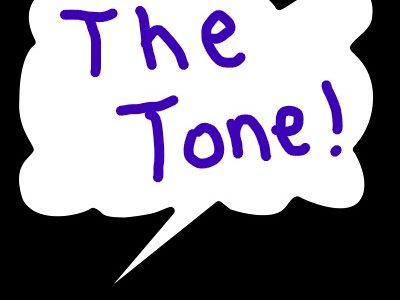
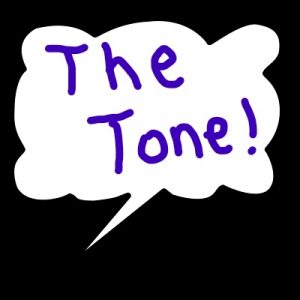
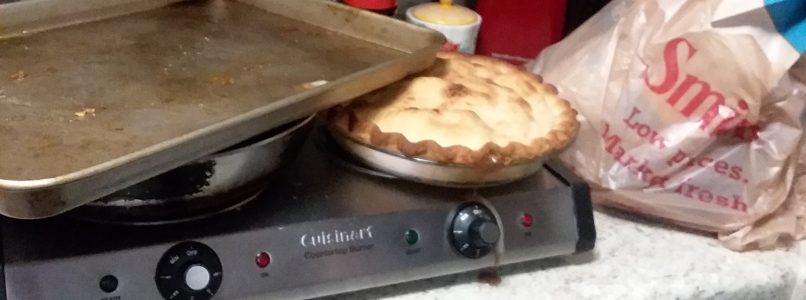
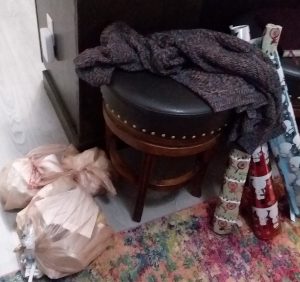
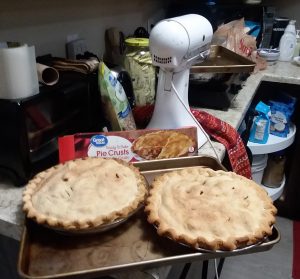 her she said that she was having tons of visits and treats but that her family could use some nurturing. Hence one apple pie.
her she said that she was having tons of visits and treats but that her family could use some nurturing. Hence one apple pie.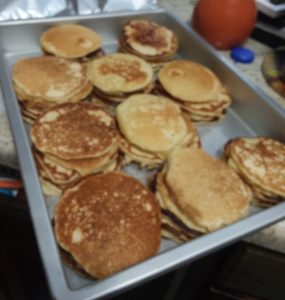 Saturday morning our church planned a Christmas breakfast. That’s right, breakfast. I would have opted to take a breakfast casserole, but my husband has a family tradition of Green Chili Pancakes and it’s so unique that he really wanted to share
Saturday morning our church planned a Christmas breakfast. That’s right, breakfast. I would have opted to take a breakfast casserole, but my husband has a family tradition of Green Chili Pancakes and it’s so unique that he really wanted to share  it. The problem is, he doesn’t know how to make it, I do. His grannie taught me. : ) So I needed to make 50 pancakes and then a huge pot of the green chili sauce. It was too much to do Saturday morning, so it had to be done on Friday. This is very delicious by the way.
it. The problem is, he doesn’t know how to make it, I do. His grannie taught me. : ) So I needed to make 50 pancakes and then a huge pot of the green chili sauce. It was too much to do Saturday morning, so it had to be done on Friday. This is very delicious by the way. 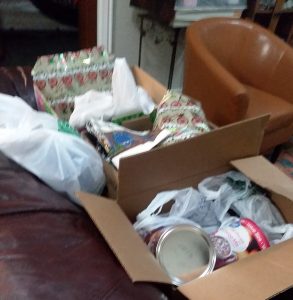 Long story. And I also realized that I needed a formatted document to include with a special framed family genealogy chart we are sending to our children. We are direct descendants of William Brewster of the Mayflower and I wanted to help each family understand who he was, what his family was like, and why they came to America.
Long story. And I also realized that I needed a formatted document to include with a special framed family genealogy chart we are sending to our children. We are direct descendants of William Brewster of the Mayflower and I wanted to help each family understand who he was, what his family was like, and why they came to America.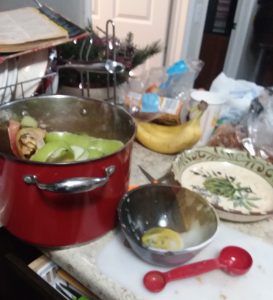 It’s Saturday morning now. The church breakfast is done. The chili pancakes were a success. Everyone loved the pies which have been eaten and I am heading off to do the tent kit and get the rest of the stuff wrapped and shipped. My house is a disaster and the kitchen cabinets can’t even be seen. I haven’t vacuumed, dusted, or cleaned anything. Laundry is piling up but I did get one load in before the breakfast. Another big woohoo!
It’s Saturday morning now. The church breakfast is done. The chili pancakes were a success. Everyone loved the pies which have been eaten and I am heading off to do the tent kit and get the rest of the stuff wrapped and shipped. My house is a disaster and the kitchen cabinets can’t even be seen. I haven’t vacuumed, dusted, or cleaned anything. Laundry is piling up but I did get one load in before the breakfast. Another big woohoo!

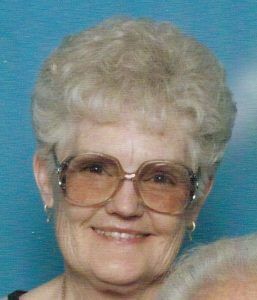

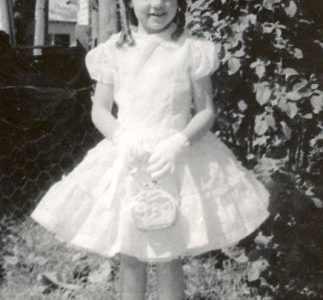
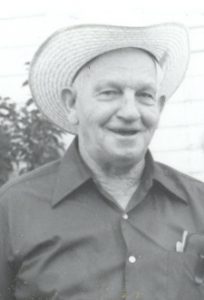

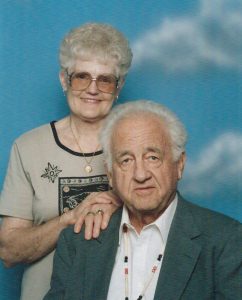
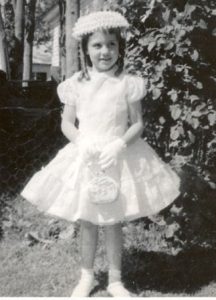
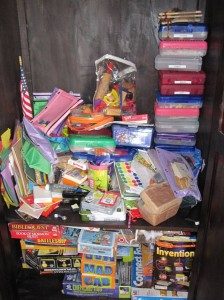

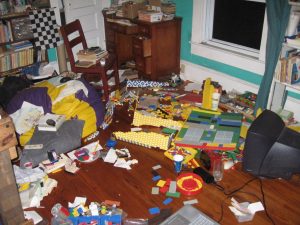 Each item we own requires some of our energy. The more belongings we have, the more emotional energy, as well as physical energy, is needed to maintain it. I want you to visualize something.
Each item we own requires some of our energy. The more belongings we have, the more emotional energy, as well as physical energy, is needed to maintain it. I want you to visualize something.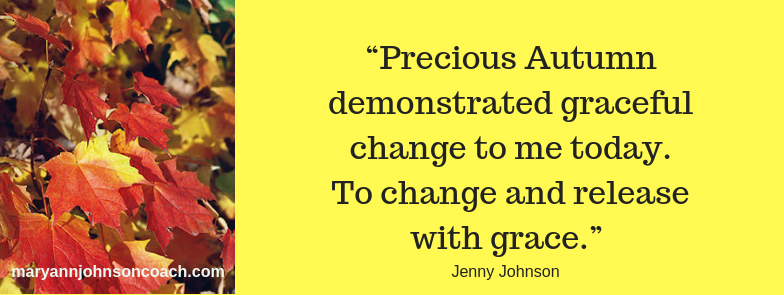

 Fall is in the air- I love it! Although it still seems a bit like summer here in the west where I live, I know fall is just around the corner. There’s a slight chill to the air and the suns rays seem a bit thinner. The flowers are brilliant and blooming like mad in the final days of warm weather.
Fall is in the air- I love it! Although it still seems a bit like summer here in the west where I live, I know fall is just around the corner. There’s a slight chill to the air and the suns rays seem a bit thinner. The flowers are brilliant and blooming like mad in the final days of warm weather. to be closed up for winter with too many obligations, too much stuff, too few hours for home and family or feelings that burden my days and nights. Winter is for rest and I want to be free to rest.
to be closed up for winter with too many obligations, too much stuff, too few hours for home and family or feelings that burden my days and nights. Winter is for rest and I want to be free to rest.